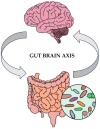The Gut-Brain Axis in Schizophrenia: The Implications of the Gut Microbiome and SCFA Production
- PMID: 37892465
- PMCID: PMC10610543
- DOI: 10.3390/nu15204391
The Gut-Brain Axis in Schizophrenia: The Implications of the Gut Microbiome and SCFA Production
Abstract
Schizophrenia, a severe mental illness affecting about 1% of the population, manifests during young adulthood, leading to abnormal mental function and behavior. Its multifactorial etiology involves genetic factors, experiences of adversity, infection, and gene-environment interactions. Emerging research indicates that maternal infection or stress during pregnancy may also increase schizophrenia risk in offspring. Recent research on the gut-brain axis highlights the gut microbiome's potential influence on central nervous system (CNS) function and mental health, including schizophrenia. The gut microbiota, located in the digestive system, has a significant role to play in human physiology, affecting immune system development, vitamin synthesis, and protection against pathogenic bacteria. Disruptions to the gut microbiota, caused by diet, medication use, environmental pollutants, and stress, may lead to imbalances with far-reaching effects on CNS function and mental health. Of interest are short-chain fatty acids (SCFAs), metabolic byproducts produced by gut microbes during fermentation. SCFAs can cross the blood-brain barrier, influencing CNS activity, including microglia and cytokine modulation. The dysregulation of neurotransmitters produced by gut microbes may contribute to CNS disorders, including schizophrenia. This review explores the potential relationship between SCFAs, the gut microbiome, and schizophrenia. Our aim is to deepen the understanding of the gut-brain axis in schizophrenia and to elucidate its implications for future research and therapeutic approaches.
Keywords: blood–brain barrier; gut microbiota; gut–brain axis; schizophrenia; short-chain fatty acids.
Conflict of interest statement
The authors declare no conflict of interest.
Figures
Similar articles
-
The microbiota-gut-brain axis participates in chronic cerebral hypoperfusion by disrupting the metabolism of short-chain fatty acids.Microbiome. 2022 Apr 17;10(1):62. doi: 10.1186/s40168-022-01255-6. Microbiome. 2022. PMID: 35430804 Free PMC article.
-
The Role of Short-Chain Fatty Acids From Gut Microbiota in Gut-Brain Communication.Front Endocrinol (Lausanne). 2020 Jan 31;11:25. doi: 10.3389/fendo.2020.00025. eCollection 2020. Front Endocrinol (Lausanne). 2020. PMID: 32082260 Free PMC article. Review.
-
Short chain fatty acids: Microbial metabolites for gut-brain axis signalling.Mol Cell Endocrinol. 2022 Apr 15;546:111572. doi: 10.1016/j.mce.2022.111572. Epub 2022 Jan 20. Mol Cell Endocrinol. 2022. PMID: 35066114 Review.
-
Short-chain fatty acids: microbial metabolites that alleviate stress-induced brain-gut axis alterations.J Physiol. 2018 Oct;596(20):4923-4944. doi: 10.1113/JP276431. Epub 2018 Aug 28. J Physiol. 2018. PMID: 30066368 Free PMC article.
-
The Role of Short-Chain Fatty Acids in Microbiota-Gut-Brain Cross-Talk with a Focus on Amyotrophic Lateral Sclerosis: A Systematic Review.Int J Mol Sci. 2023 Oct 11;24(20):15094. doi: 10.3390/ijms242015094. Int J Mol Sci. 2023. PMID: 37894774 Free PMC article. Review.
Cited by
-
Unveiling the gut microbiota blueprint of schizophrenia: a multilevel omics approach.Front Psychiatry. 2024 Sep 25;15:1452604. doi: 10.3389/fpsyt.2024.1452604. eCollection 2024. Front Psychiatry. 2024. PMID: 39386896 Free PMC article.
-
Metabolic Characteristics of Gut Microbiota and Insomnia: Evidence from a Mendelian Randomization Analysis.Nutrients. 2024 Sep 2;16(17):2943. doi: 10.3390/nu16172943. Nutrients. 2024. PMID: 39275260 Free PMC article.
-
Investigating the Impacts of Diet, Supplementation, Microbiota, Gut-Brain Axis on Schizophrenia: A Narrative Review.Nutrients. 2024 Jul 11;16(14):2228. doi: 10.3390/nu16142228. Nutrients. 2024. PMID: 39064675 Free PMC article. Review.
-
Short-chain fatty acids suppresses astrocyte activation by amplifying Trp-AhR-AQP4 signaling in experimental autoimmune encephalomyelitis mice.Cell Mol Life Sci. 2024 Jul 8;81(1):293. doi: 10.1007/s00018-024-05332-x. Cell Mol Life Sci. 2024. PMID: 38976012 Free PMC article.
-
Role of short-chain fatty acids in host physiology.Animal Model Exp Med. 2024 Oct;7(5):641-652. doi: 10.1002/ame2.12464. Epub 2024 Jun 28. Animal Model Exp Med. 2024. PMID: 38940192 Free PMC article. Review.
References
-
- Varese F., Smeets F., Drukker M., Lieverse R., Lataster T., Viechtbauer W., Read J., van Os J., Bentall R.P. Childhood adversities increase the risk of psychosis: A meta-analysis of patient-control, prospective- and cross-sectional cohort studies. Schizophr. Bull. 2012;38:661–671. doi: 10.1093/schbul/sbs050. - DOI - PMC - PubMed
Publication types
MeSH terms
Substances
Grants and funding
LinkOut - more resources
Full Text Sources
Medical




